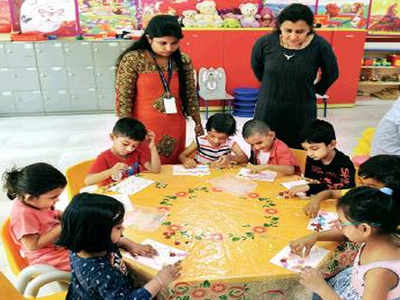Explore, Learn, and Grow: The Benefits of Preschool for Your Child’s Development

Preschool is a crucial stepping stone in a child's educational journey. It provides a structured, nurturing environment where children can explore, learn, and grow. While some parents may question the benefits of enrolling their child in preschool, research shows that it can have a significant positive impact on their development.
One key benefit of preschool is the socialization opportunities it offers. In a preschool setting, children interact with their peers and learn important social skills such as sharing, taking turns, and cooperation. They also have the chance to develop friendships and learn how to navigate social situations. These early social experiences lay the foundation for positive social interactions later in life.
Preschool also fosters cognitive development. Children are exposed to a wide range of activities that stimulate their curiosity and promote critical thinking. They engage in hands-on learning experiences that encourage problem-solving and decision-making skills. Preschool classrooms are designed to promote exploration and discovery, with various learning centers and materials that help children develop their cognitive abilities.
Furthermore, preschool provides a structured learning environment that prepares children for future academic success. They learn how to follow instructions, listen attentively, and participate in group activities. These skills are essential for success in elementary school and beyond. By attending preschool, children develop a strong foundation in literacy, numeracy, and other academic areas, setting them up for a smooth transition to formal schooling.
Another advantage of preschool is that it enhances language development. In a preschool setting, children are exposed to rich language experiences through conversations, stories, rhymes, and songs. They learn new vocabulary, improve their communication skills, and develop a love for reading and writing. Research has shown that children who attend preschool have stronger language skills than those who do not, giving them an advantage in their later educational journey.
Preschool also plays a crucial role in developing emotional and self-regulation skills. Children learn how to identify and express their emotions in a healthy way. They develop empathy and understanding towards others, as well as learn strategies to manage their own behavior. Preschool provides a safe and supportive environment where children can practice these skills and learn to navigate their emotions effectively.
Lastly, preschool promotes independence and self-confidence. Children are encouraged to make choices, take responsibility for their actions, and solve problems independently. They gain a sense of accomplishment and develop a positive self-image as they acquire new skills and overcome challenges. Preschool helps children build a strong sense of self and prepares them for the independence required in later stages of their lives.
In conclusion, enrolling your child in preschool can greatly benefit their overall development. It provides valuable socialization opportunities, fosters cognitive and language development, prepares them for academic success, enhances emotional and self-regulation skills, and promotes independence and self-confidence. Preschool sets the stage for a lifetime of learning and growth, equipping children with the necessary skills and tools to thrive academically, socially, and emotionally.